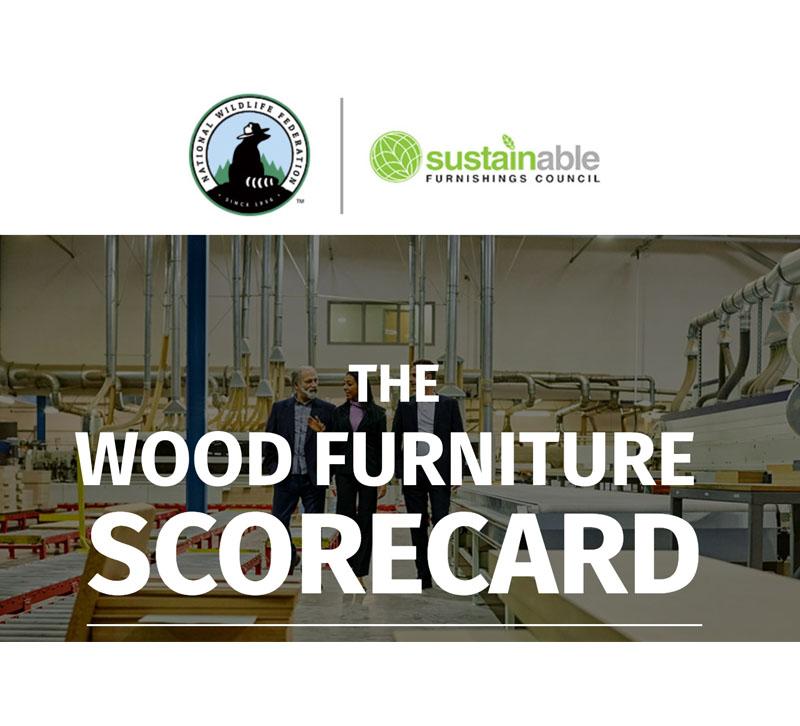Sustainability is becoming an increasingly important factor in consumers’ eyes when they go to purchase a new piece of furniture. Last month, the Sustainable Furnishings Council (SFC) and The National Wildlife Federation (NWF) launched the Wood Furniture Scorecard, a dedicated website providing a comprehensive assessment of wood sourcing policies for 57 leading big-box furniture retailers in North America.
“Knowing consumers are interested in transparency from the brands they are considering, we scored retailers based on the wood sourcing policies posted on their websites,” describes Susan Inglis, Executive Director of SFC. “We reached out to each company we assessed, explained our methodology and sent them the scorecard we had developed — inviting them to point out anything we might have missed, as well as offering them free help in developing and beginning to implement a robust policy.”
According to Inglis, at least 15 of the companies took advantage of the opportunity to improve their scores, creating or formalizing and strengthening their policies. “I am very pleased with the responsiveness of most of the companies we reached out to,” Inglis says, “and the conversations were very rewarding. I think this is a great leap forward on our industry’s part in protecting the forests of the world.”
How It's Helpful
The new scorecard helps consumers evaluate each retailer’s use of recycled and reclaimed wood, in addition to how each sources virgin wood. Among the seven top scorers were ABC Carpet & Home, Williams-Sonoma Group, IKEA, Crate & Barrel, Mitchell Gold+Bob Williams, City Furniture and Target. Six more companies earned honorable mentions and two companies publicly pledged to adopt comprehensive wood sourcing policies within the next year. Along with supplying consumers with information about their favorite retailers, the website offers all merchants guidance and tools designed to improve and implement their wood sourcing policies.
The idea is to promote good forest management, based on an understanding that the furniture industry might be — knowingly or not — using illegally logged and otherwise unsustainably produced wood within their complex supply chains.
“We have studied the negative impacts of deforestation on wildlife, climate and water security, and we are committed to helping consumers and companies shape a more sustainable furnishings industry,” says Barbara Bramble, NWF’s Vice President of International Conservation and Corporate Strategy.
The Goal
It’s no secret that the industry’s appetite for beautiful woods is of particular concern, given that the industry is the third largest consumer of wood (the construction and paper industries are first and second). The NWF got involved because deforestation and poor forest management are threats to wildlife throughout the world, as well as to clean water and climate security. And consumers are taking notice. In a recent SFC survey, 86 percent described themselves as “very concerned” about global deforestation.
“Through this project, we hope to empower everyone shopping for wood furniture to buy wisely, vote with their wallet and protect our world’s forest resources for future generations,” says Collin O’ Mara, President and Chief Executive of the NWF.
Inglis summed, “SFC is committed to helping consumers find the more eco-friendly products they are looking for as they furnish their homes and to helping furniture companies reduce their environmental footprint, despite the complexity of their supply chains. This scorecard serves our purpose, guiding shoppers to companies that are demonstrating leadership with a robust wood sourcing policy and also encouraging more companies to enter that leadership circle.
“Our dream,” she continues, “would be to create similar assessments with other partners on materials besides wood. If we had unlimited resources and time, we would love to work with a non-governmental organization focused on textiles, for example.” At some point, Inglis adds, “we would like to expand the scorecard to encompass smaller independent retailers as well. For now, we confer exemplary recognition on SFC member retailers of all sizes that have demonstrated that they are implementing best practices. In fact, all SFC member companies that have achieved exemplary recognition have, in effect, scored off the charts on wood sourcing.”







